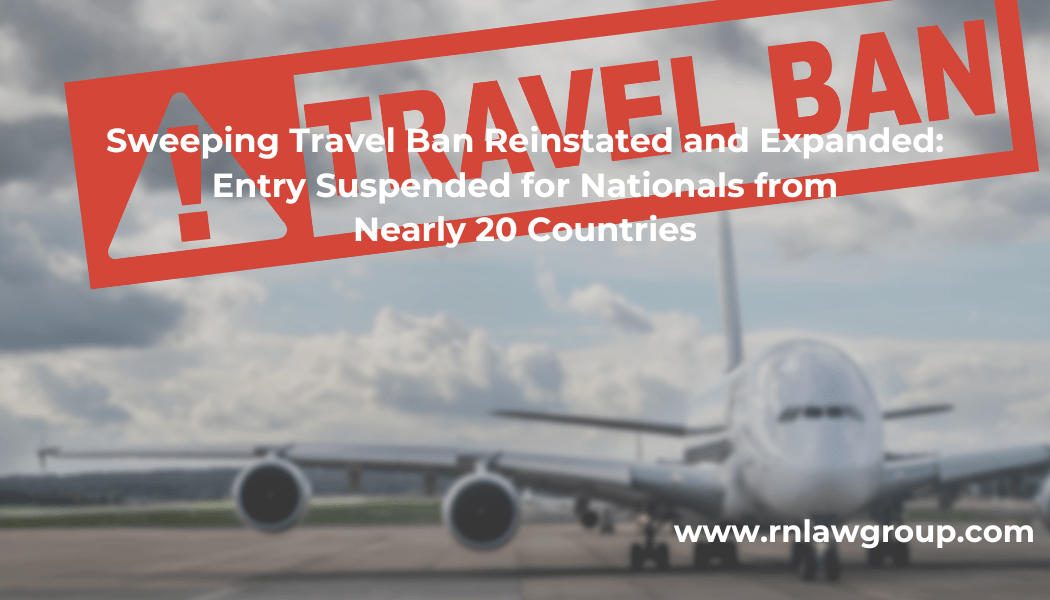
Sweeping Travel Ban Reinstated and Expanded: Entry Suspended for Nationals from Nearly 20 Countries
On June 4, 2025, President Trump signed a proclamation titled “Restricting the Entry of Foreign Nationals to Protect the United States from Foreign Terrorists and Other National Security and Public Safety Threats.” This executive order, effective June 9, 2025, at 12:01 a.m. EDT, reinstates and expands upon previous travel restrictions, citing national security concerns and the prevention of threats from foreign terrorists. The policy must be reviewed every 180 days.
Full Travel Ban Countries
The proclamation imposes a full entry ban on nationals from the following 12 countries:
- Afghanistan
- Burma
- Chad
- Republic of the Congo
- Equatorial Guinea
- Eritrea
- Haiti
- Iran
- Libya
- Somalia
- Sudan
- Yemen
Individuals from these countries are barred from entering the United States under any visa category, whether immigrant or non-immigrant. (See scope of travel ban below).
Partial Travel Ban Countries
In addition to the full bans, the order imposes partial restrictions on nationals from the following seven countries:
- Burundi
- Cuba
- Laos
- Sierra Leone
- Togo
- Turkmenistan
- Venezuela
These partial bans impact immigrant entries and certain non-immigrant visa categories, including B-1 (business visitor), B-2 (tourism), F (student), M (vocational student), and J (exchange visitor) visas. In addition, for any other nonimmigrant visa types, consular officers are instructed to limit the validity period as much as legally allowed. (See scope of travel ban below).
Scope of the Travel Ban
The travel restrictions apply only to foreign nationals from the designated countries who were outside the U.S. and did not have a valid U.S. visa on the effective date of the proclamation. Individuals already in the U.S. or holding valid visas before June 09, 2025 are not impacted by the ban.
Exceptions to the Travel Ban
The executive order outlines several exemptions to the travel restrictions. The suspension of and limitation on entry shall not apply to:
- Any lawful permanent resident of the United States;
- Any dual national of a country designated under sections 2 and 3 of this proclamation when the individual is traveling on a passport issued by a country not so designated;
- Any foreign national traveling with a valid nonimmigrant visa in the following classifications: A-1, A-2, C-2, C-3, G-1, G-2, G-3, G-4, NATO-1, NATO‑2, NATO-3, NATO-4, NATO-5, or NATO-6;
- Any athlete or member of an athletic team, including coaches, persons performing a necessary support role, and immediate relatives, traveling for the World Cup, Olympics, or other major sporting event as determined by the Secretary of State;
- Immediate family immigrant visas (IR-1/CR-1, IR-2/CR-2, IR-5) with clear and convincing evidence of identity and family relationship (e.g., DNA);
- Adoptions (IR-3, IR-4, IH-3, IH-4);
- Afghan Special Immigrant Visas;
- Special Immigrant Visas for United States Government employees; and
- Immigrant visas for ethnic and religious minorities facing persecution in Iran.
Further, the order does not apply to an individual who has been granted asylum by the United States, to a refugee who has already been admitted to the United States, or to an individual granted withholding of removal or protection under the Convention Against Torture and Other Cruel, Inhuman or Degrading Treatment of Punishment (CAT). Additionally, the order does not limit the ability of an individual to seek asylum, refugee status, withholding of removal, or protection under the CAT, consistent with the laws of the United States.
The travel ban is a significant shift in U.S. immigration policy, affecting individuals from nearly 20 countries. Given the broad scope of the order and the nuanced exceptions, it is critical for impacted individuals and organizations to assess how the restrictions may apply to their specific circumstances. Our team is closely monitoring developments. Contact us to schedule a consultation and stay informed on how to navigate the current immigration landscape.
By: Krystal Alanis
Krystal Alanis is a Partner at Reddy Neumann Brown PC and manages the firm’s PERM Labor Certification Department, where she oversees all EB-2 and EB-3 employment-based green card matters. Krystal guides clients from a variety of industries through the maze of the PERM Labor certification process and has handled thousands of PERM applications throughout her career with Reddy Neumann Brown PC. Krystal also guides employers and individuals through the I-140 and Adjustment of Status process, and assists clients with temporary work visa petitions (e.g., H-1B, TN, L-1, E-2). With over 13 years of immigration experience, Krystal is able to advise her clients with confidence and recognize any potential pitfalls that may arise.

